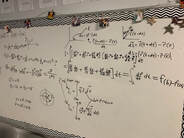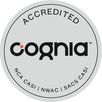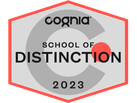IDEAVENTIONS ACADEMY
 Student math work Student math work The teaching of math is fascinating. It is fascinating and complex. More than any of our other content areas, we have learned so much from our journey. A few years ago, at an MIT Club dinner, the gentleman next to me asked “Have you figured out how to teach problem solving?” My answer was quick, and I was excited to hear his response, “No, not yet, do you know how?” Alas he didn’t, and it led to a fun conversation about the teaching of math. Problem solving is at the core of math, and we’re still working on figuring out how to teach it to a broad range of students. Our experience has been illuminating, and a fun challenge to tackle. When we designed the school, we read the research and work done by Patrick Suppes at Stanford University’s EPGY and by Julian Stanley at Johns Hopkins’ CTY to inform our approach that allowed students of varied math levels to progress at their own pace so that they could reach mathematically challenging material that would keep them engaged. Math, unlike other subjects taught in school (with the exception of foreign languages), builds on itself and requires a mastery of prior material to fully understand the new material being presented. In theory, self-paced math using adaptive technologies appears as a perfect solution. In practice, we found that it works for a smaller percentage of the population than we expected from the research, and even for those students for whom it works, they prefer the interaction with a person. The beauty of our school being a 4th-12th school is that it’s like a longitudinal study; You see how choices made in elementary years affect performance in high school. Here are some of our findings:
For today, I will expand on this last bullet point, and we’ll visit other learnings in later posts. We have found some common areas of struggle in math which include computation errors, copying mistakes or not showing work, anxiety and freezing when working on a problem, and not understanding what the problem is asking. This is not an exhaustive list, and each could be the subject of its own post, but we’ll briefly explore each one.
An observation in teaching that took me by surprise, that shouldn’t have, is that I always need more time. I feel that I could fill an entire year of school with just one area of exploration, and we could have great fun exploring. Next year, we are adding an extra math period for math that will give us time to explore additional topics not covered in elementary and middle-school math curricula, such as set theory and proofs. That extra time is also being built in so that students have an opportunity to explore how they learn math. See you next week as we continue to explore math!
0 Comments
Your comment will be posted after it is approved.
Leave a Reply. |
AuthorJuliana Heitz is co-founder of Ideaventions Academy and is very excited to share the thinking behind the Academy. Archives
October 2023
Categories |
Copyright © 2010-2024| 12340 Pinecrest Road, Reston, Virginia 20191 | 703-860-0211 | admissions@ideaventionsacademy.org | Tax ID 27-2420631 | CEEB Code 470033
 RSS Feed
RSS Feed



